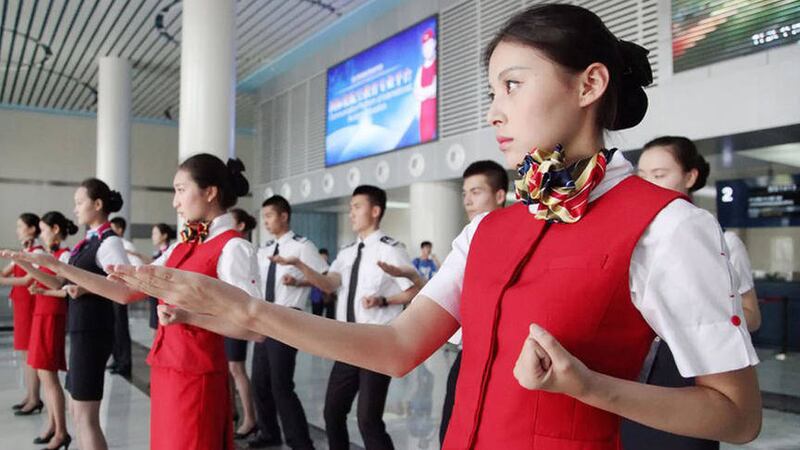FEMALE cabin crew don't have an easy time of it, in spite of the nice uniforms and the chance to visit glamorous destinations. They get called trolly dollies, they have rapid turnarounds in sometimes unglamorous airports and, worst of all, they have to cope with increasing amounts of antisocial behaviour in the air.
It's estimated that air-rage incidents increased by just under 30 per cent between 2009 and 2010. Recently a United Airlines aeroplane made an unscheduled landing at Belfast International Airport because the behaviour of a male passenger en route from Rome to Chicago was considered a threat to the plane's security.
Elsewhere, a Scottish man called Andrew Tosh was sentenced to nine months in jail this month after sexually assaulting an air hostess. Assaults, drunkenness and abusive in flight behaviour – what you might call serious trouble at 38,000 feet – appears to be on the increase.
What is the answer? Airlines have to work out their response. A Ryanair spokesman says: "We have a zero tolerance policy towards disruptive passengers. We definitely don't tolerate unruly or disruptive behaviour at any time and the safety and comfort of our customers, crew and aircraft is our number one priority.”
Micki Miles, general manager of Jet2.com's cabin services, sets out their similar policy: "Truthfully, this is a problem that is increasing although you have to say it's a very small percentage of our passengers who are disruptive."
Miles says she doesn't like the term 'air rage', preferring to describe the antisocial behaviour she has occasionally witnessed and heard about as "boisterous". Some of it, though, is extremely boisterous.
"You can't escape from a disruptive passenger on a plane but we do give our cabin crew great training. It's also important not to stereotype passengers, though," she says, before recounting an unedifying story about two older women passengers who "had probably had a drink" before boarding their flight.
Alcohol is a recurring theme in the discussion of bad in-flight behaviour and airlines like Jet2.com, which naturally takes its responsibility to maintain calm and safe flights seriously, can't always control who comes up the stairs.
Miles adds: "The problem now is that passengers start drinking in the terminal before they reach check-in. There's a lot of responsibility on airports themselves to control this. Nervous flyers may have a drink to take the edge off their anxiety but can usually manage their behaviour. One or two others may arrive drunk at check-in and then it's up to the staff there to stop them boarding. But of course, the passengers may then become angry."
Solutions include training staff to deal with problems if they arise. As with other airlines, Jet2.com training for cabin crew is the same for women and men. Employees take an intensive four-week course which includes a bit of physical self-defence, how to recognise and anticipate problems with passengers, as well as vital techniques to de-escalate a bad situation.
You kind of hope there may be handcuffs on board your Airbus for unruly travellers. Miles laughs when I ask whether there are tranquilliser darts for use on difficult passengers.
"No, although as an airline we have discussed carrying restraints. As of now, we don't because we think it could make any difficult situation worse in the rare incident that someone misbehaves. Other passengers have been known to come and help cabin crew if there is a tricky situation. We often have retired policemen on board any given flight and in fact, members of our cabin crew include former police officers."
So what has been Miles's trickiest bad passenger behaviour moment? "The scariest incident for me was a few years back now and involved a fit young marine. I was working as cabin crew on a holiday flight to Ajaccio. He was OK boarding and went to sleep. What we didn't know was that he'd drunk a bottle of Jim Beam whisky before boarding. He woke up mid-flight, wanted to use the toilet, became aggressive and wouldn't do what he was asked."
So what did she do? "We reasoned with him and happily, he eventually went back to sleep which seemed like a good thing. However, when we landed, he walked to the front of the plane, dropped his trousers and urinated on row 1."
The crew called the police, two Italian policemen came on board, arrested the man and he was locked up to sober down. Rather like Gerard Depardieu who peed in public after boarding a flight at Paris and was escorted off the jet.
Miles admits she now has her dream job and still enjoys doing some cabin crew work once a month to see how the operation is working. As she says, it is fun to tell the person asking about your day that you've just been to Majorca and back. She also says it's enjoyable taking families and other passengers on holiday.
"There's a good atmosphere and we try to make their experience enjoyable. This trip is important to them and they may have saved all year to go away," she says.
Then she sums up the importance of the role that really isn't just about reciting the safety measures and looking good in a scarf. Psychology and maturity are both crucial qualifications, which is why many female cabin crew are well out of their twenties.
"Passengers expect us to be trolley dollies until something happens on a flight. Then we become policemen, firemen, the emergency service. I always say we're the 999 team on board."
FAMOUS AIR RAGE INCIDENTS
Air rage or disorderbly disturbance may affect anyone, even celebs. Some of the best known examples are:
:: Last month police officers met a flight from Bodrum in Turkey to London after supermodel Kate Moss was accused of having been disruptive. En route, she reportedly quaffed vodka from a bottle in her hand luggage, though fellow passengers felt the flight crew had overreacted to the incident. No arrests were made.
:: Former bassist Peter Buck famously threw yoghurt at a fellow passenger in first class on a flight from Seattle to Heathrow in 2002. He was charged with being drunk on an aircraft and of two counts of common assault against air stewards plus one charge of damaging British Airways crockery. Buck denied the charge and was acquitted.
:: Not in the air but at the airport, Diana Ross lost it in 1999 when a Heathrow security guard frisked her. She allegedly confronted the woman officer, touched her and said "This is how it feels to be fondled..." Ross boarded her British Airways flight but was then asked to disembark and was detained for five hours by airport police. No charges were filed.








